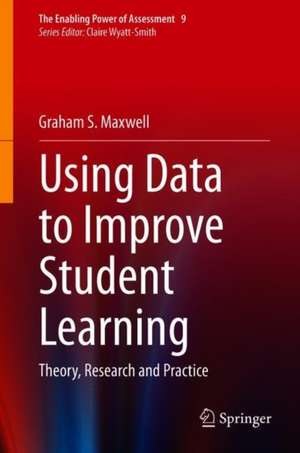Using Data to Improve Student Learning: Theory, Research and Practice: The Enabling Power of Assessment, cartea 9
Autor Graham S. Maxwellen Limba Engleză Hardback – 22 apr 2021
Preț: 902.23 lei
Preț vechi: 1100.28 lei
-18% Nou
Puncte Express: 1353
Preț estimativ în valută:
172.66€ • 179.60$ • 142.54£
172.66€ • 179.60$ • 142.54£
Carte tipărită la comandă
Livrare economică 15-29 aprilie
Preluare comenzi: 021 569.72.76
Specificații
ISBN-13: 9783030635374
ISBN-10: 3030635376
Ilustrații: XV, 405 p. 1 illus.
Dimensiuni: 155 x 235 mm
Greutate: 0.77 kg
Ediția:1st ed. 2021
Editura: Springer International Publishing
Colecția Springer
Seria The Enabling Power of Assessment
Locul publicării:Cham, Switzerland
ISBN-10: 3030635376
Ilustrații: XV, 405 p. 1 illus.
Dimensiuni: 155 x 235 mm
Greutate: 0.77 kg
Ediția:1st ed. 2021
Editura: Springer International Publishing
Colecția Springer
Seria The Enabling Power of Assessment
Locul publicării:Cham, Switzerland
Cuprins
Part 1: Background Issues and Challenges.- Chapter 1. Introduction: Why the Current Emphasis on Data?.- Chapter 2. Different models (and Movements) of Data Use.- Chapter 3. Data in Context: The School as a Social Organisation.- Chapter 4. Defining and Assessing Appropriate Learning Outcomes.- Part 2: Meeting the Challenges: Managing the Processes.- Chapter 5. Collecting Data: Creating Databases.- Chapter 6. Validity Issues: Ensuring Data are Appropriate.- Chapter 7. Managing Databases: Making Data Accessible.- Chapter 8. Interpreting Data (Technically and Meaningfully).- Chapter 9. Decision Issues: Taking Actions Based on Data.- Chapter 10. Leading and Developing Professional Expertise.- Part 3: Future Challenges.- Chapter 11. Possibilities for Practice and Research.
Notă biografică
Graham Samuel Maxwell, PhD, BSc, BEd, DipEd (UQ), MA (UMinn), FACE has extensive professional experience in teaching, teacher education, educational research and educational policy, with expertise in educational assessment, measurement, data analysis, standards and moderation. His professional career began as a teacher of mathematics and science in Queensland 1962–1967. After graduate studies at the University of Minnesota, he returned to an appointment in the School of Education, University of Queensland lasting 30 years (1972–2002). He spent three years (2002–2005) as a Deputy Director of the Queensland Studies Authority where he was responsible for advising on curriculum and assessment policy and research and managing the statewide systems of assessment, moderation and testing. Subsequently, he became an independent consultant. From 2011 to 2014 he was an Adjunct Professor in the Griffith Institute for Educational Research, Griffith University. From 2014 to 2021 he has been an Honorary Professor of Australian Catholic University, in the Institute for Learning Sciences and Teacher Education. His research, publications and consultancies have ranged from preschool to postgraduate, across all sectors of education and training, and for various boards, agencies, authorities and associations, in local, state, national and international contexts.
Textul de pe ultima copertă
This book offers a coherent research-based overview and analysis of theories and practices in using data to improve student learning. It clarifies what 'use of data' means and differentiates the different levels of decision-making in education (relating to the system, district, school, classroom, or individual student). The relationship between data and decision-making is considered and various movements in the use of data to improve student learning are analysed, especially from the perspective of their assumptions and effects. This leads to a focus on effective educational decision-making as a social process requiring collaboration among all relevant participants. It also requires a clear understanding of educational aims, and these are seen to transcend what can be assessed by standardised tests. The consequences of this analysis for decision processes are explored and conclusions are drawn about what principles might best guide educational practice as well as what ambiguities remain. Throughout, the focus is on what existing research says about each of the issues explored.
Caracteristici
Comprehensive review of research on educational use of data with an international perspective Includes all major models for educational improvement and considers data use from system-wide to classroom levels Considers fundamental principles, research findings and unresolved issues as well as offering guidelines for policy and practice









